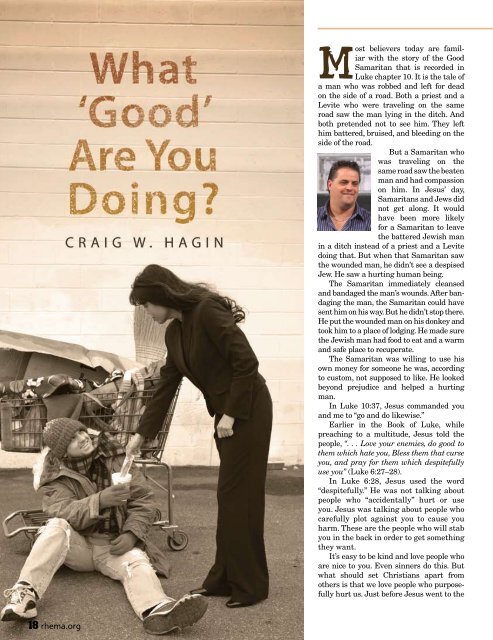Click here to download the PDF. - Rhema
Click here to download the PDF. - Rhema
Click here to download the PDF. - Rhema
Create successful ePaper yourself
Turn your PDF publications into a flip-book with our unique Google optimized e-Paper software.
18 rhema.org<br />
Most believers <strong>to</strong>day are familiar<br />
with <strong>the</strong> s<strong>to</strong>ry of <strong>the</strong> Good<br />
Samaritan that is recorded in<br />
Luke chapter 10. It is <strong>the</strong> tale of<br />
a man who was robbed and left for dead<br />
on <strong>the</strong> side of a road. Both a priest and a<br />
Levite who were traveling on <strong>the</strong> same<br />
road saw <strong>the</strong> man lying in <strong>the</strong> ditch. And<br />
both pretended not <strong>to</strong> see him. They left<br />
him battered, bruised, and bleeding on <strong>the</strong><br />
side of <strong>the</strong> road.<br />
But a Samaritan who<br />
was traveling on <strong>the</strong><br />
same road saw <strong>the</strong> beaten<br />
man and had compassion<br />
on him. In Jesus’ day,<br />
Samaritans and Jews did<br />
not get along. It would<br />
have been more likely<br />
for a Samaritan <strong>to</strong> leave<br />
<strong>the</strong> battered Jewish man<br />
in a ditch instead of a priest and a Levite<br />
doing that. But when that Samaritan saw<br />
<strong>the</strong> wounded man, he didn’t see a despised<br />
Jew. He saw a hurting human being.<br />
The Samaritan immediately cleansed<br />
and bandaged <strong>the</strong> man’s wounds. After bandaging<br />
<strong>the</strong> man, <strong>the</strong> Samaritan could have<br />
sent him on his way. But he didn’t s<strong>to</strong>p t<strong>here</strong>.<br />
He put <strong>the</strong> wounded man on his donkey and<br />
<strong>to</strong>ok him <strong>to</strong> a place of lodging. He made sure<br />
<strong>the</strong> Jewish man had food <strong>to</strong> eat and a warm<br />
and safe place <strong>to</strong> recuperate.<br />
The Samaritan was willing <strong>to</strong> use his<br />
own money for someone he was, according<br />
<strong>to</strong> cus<strong>to</strong>m, not supposed <strong>to</strong> like. He looked<br />
beyond prejudice and helped a hurting<br />
man.<br />
In Luke 10:37, Jesus commanded you<br />
and me <strong>to</strong> “go and do likewise.”<br />
Earlier in <strong>the</strong> Book of Luke, while<br />
preaching <strong>to</strong> a multitude, Jesus <strong>to</strong>ld <strong>the</strong><br />
people, “. . . Love your enemies, do good <strong>to</strong><br />
<strong>the</strong>m which hate you, Bless <strong>the</strong>m that curse<br />
you, and pray for <strong>the</strong>m which despitefully<br />
use you” (Luke 6:27–28).<br />
In Luke 6:28, Jesus used <strong>the</strong> word<br />
“despitefully.” He was not talking about<br />
people who “accidentally” hurt or use<br />
you. Jesus was talking about people who<br />
carefully plot against you <strong>to</strong> cause you<br />
harm. These are <strong>the</strong> people who will stab<br />
you in <strong>the</strong> back in order <strong>to</strong> get something<br />
<strong>the</strong>y want.<br />
It’s easy <strong>to</strong> be kind and love people who<br />
are nice <strong>to</strong> you. Even sinners do this. But<br />
what should set Christians apart from<br />
o<strong>the</strong>rs is that we love people who purposefully<br />
hurt us. Just before Jesus went <strong>to</strong> <strong>the</strong>

















